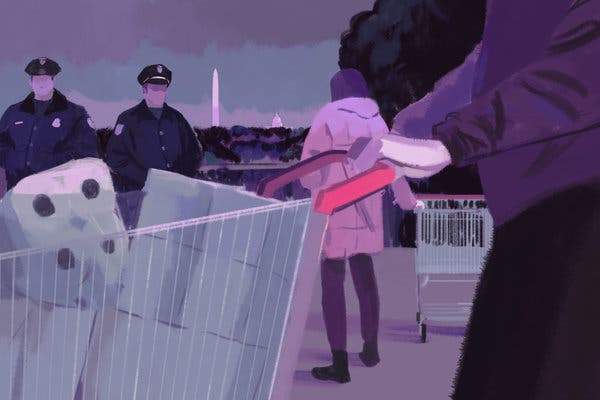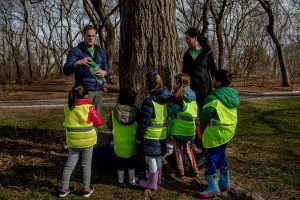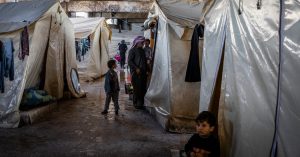The Covid-19 pandemic is gutting the global economy and forcing entire nations into quarantine. While reporting on devastation that is incomprehensibly big, our reporters have been accumulating in their notebooks some moments that are compelling because they are small.
New York
Two Withdrawals, Split 13 Ways
At 11 a.m. on a Wednesday, the designer Hilton Hollis was standing in line at his local Chase Bank branch at 73rd Street and Broadway. A teller asked the elderly man in front of him why he was making such a huge cash withdrawal — an amount that looked to Mr. Hollis like tens of thousands of dollars.
The man was wearing a mask and gloves, and he looked frail and sick. He had a difficult time walking up to the window. His wife, also wearing a mask and gloves, was at the next window, also withdrawing huge amounts of cash. She overheard the question.
“What did you say to him?” she called out to the bank teller.
“I didn’t say anything bad,” the teller replied.
But the wife would not let it go. She asked him again.
“I just asked him what he was going to do with all this money he’s taking out,” the teller said.
The woman got angry. “That is none of your business,” she said. “But if you must know, he has the virus, we have 13 grandchildren, and we are dividing our money among them.”
Eventually, the couple collected their stacks of what looked like $100 bills, stuffed them in their pockets and slowly left the bank. — Helene Cooper
Washington
It Wasn’t ‘Only’ Toilet Paper
On Monday night, three police cars sat outside a CVS in northwest Washington, lights flashing, while officers stood in the doorway of the drugstore, watching the unboxing of a delivery of Cottonelle.
The mood among shoppers was calm enough, even collegial. There were maybe 20, and they took the goods directly from the deliverymen. “There’s no Charmin!” one said. Another shopper — my father — thought to himself, “Lady, it’s only toilet paper.”
It wasn’t “only” toilet paper. Not when its delivery required the cops. Not when holding half a dozen rolls in your arms felt like pressing a security blanket to your chest.
My dad needed to make sense of things, so he walked up to the police. “You guys are here just —”
A policewoman smiled at him. “Just to ensure that everything is going to be OK.” — Jennifer Miller
London
‘Everything Bad Comes From China’
It felt important to support the small shops nearby. It also seemed logical. Panic buying had laid waste to supermarket shelves, but my local grocery in south London had boxes brimming with produce.
As I filled a basket with vegetables, milk and cookies, I began to overhear the man at the till complaining about the coronavirus and saying he would be forced to close. As I shuffled up, I greeted him as usual and asked how he was.
He looked at me. “Everything bad comes from China,” he said. “SARS came from China.” MERS, too, he said. “From camels, to bats, to Chinese people.”
The man behind me in line laughed, trying to defuse the tension. “Oh, I don’t think it’s China,” he said. “I think it’s the Americans!”
I just wanted to get some shopping done. As I left, a woman in line smiled and met my eyes. “How do these people decide who to blame?” she said, kindly.
The man at the till raised his voice: “I hope your people sort this out.” — Amie Tsang
London
We’ll Ride It Out in the Cotswolds
In Hampstead, a famously posh neighborhood in north London, the arrival of a delivery truck in front of a grocery store provoked a scramble. It was a Wednesday morning. Over the weekend, Britons had finally begun to stop wandering around merrily in the sunshine, a sense taking hold that the virus was really a thing, and shoppers had comprehensively emptied the store’s shelves of things like soup and crushed tomatoes. The pasta section was bare, save for gluten-free lentil penne. Frozen pizzas were no more. Toilet paper was gone without a trace. Maybe now the truck was bringing more?
The deliveryman rolled a couple of pallets inside. They contained only bread and bananas. Shoppers jostled irritably for what slim pickings remained, while the checkout line snaked all the way back to the frozen foods section.
Nearby, at a high-end greengrocer, a Frenchwoman was buying apples. She told the cashier that she had taken her children out of school and rented a house in the Cotswolds, a lush swath of country to the northwest. They would ride out the pandemic there.
On the main street running through Hampstead Village, a travel agency remained open, but a sign beseeched people to consider telephoning rather than walking in. Down the street, the post office was shut at midday. A sign explained: Clerks were at home in quarantine. The same went for an HSBC bank branch. The butcher was doing a brisk business. The prime minister would not order a national lockdown for another five days. — Peter S. Goodman
Oakland, Calif.
Legislating From the Living Room
Living rooms got Buffy Wicks elected. Her campaign for the California State Assembly two years ago was powered by 239 house parties — intimate living-room gatherings full of hugs and handshakes and locking down votes. At every one, Ms. Wicks would trot out a line about her 6-month-old daughter, Jojo. “She can’t be the reason I don’t run,” she would say. “She’s the reason I have to run.”
Now Wicks and Jojo are both at home in Oakland under a shelter-in-place order. Jojo is 3, playing with Magna-Tiles and trains while Ms. Wicks cycles through legislative conference calls. A week ago, she co-signed a letter to Gov. Gavin Newsom calling for a 45-day moratorium on foreclosures, evictions and utility shut-offs in the state. She has made calls to food banks and to small businesses that are laying off employees. And she has had to make time for visits to the obstetrician: Ms. Wicks is pregnant with her second child.
She went to her 20-week appointment in between conference calls, armed with wipes. Wipes for doors, armrests and car keys. She washed her hands after touching the doctor’s clipboard and then wiped her way back to the parking lot, the car and home, to the makeshift legislative office in her living room. — Conor Dougherty
Verona, Italy
‘We Can Go Really Fast’
“I grew up in Serbia during the bombings,” Marko Milanovic said. “They taught us how to eat during the war. But I have no idea how I am going to pay my rent if this keeps going.”
It was 8 p.m., in front of the San Nicolò church in Verona, Italy. Mr. Milanovic and other food delivery drivers had gathered there as they always did at that time — a ritual for the start of the dinner rush. Except now, of course, there was no rush, and they stood three feet apart from one another in the deserted and silent town.
“Come on, we are not at war.” Mr. Milanovic’s friend Giancarlo Romanelli was trying to reassure him. They were both drivers for a platform called My Menu.
Mr. Milanovic wasn’t having it. He screamed at Mr. Romanelli. Originally, he had studied to become an electrician, but two years ago he decided to work as a food deliveryman because he enjoyed the job’s outdoor and flexible nature. Now he is 26, and seeing the downside.
“In this situation, we are the first ones to lose, because we are at the bottom,” he said, “with no protection from the company and no protection from the state.”
“We cannot work from home,” a third driver, Pietro Sterza, said. “If we stay home, we don’t get paid.” He is 22. He had started in high school and went full time after graduating. The only positive about the situation, he said, “is that the streets are empty, and we can go really fast.” — Emma Bubola
Milan
‘The Most Beautiful Thing’
Alessandro Romaioli tilted his camera to show me, via WhatsApp, a batch of plastic widgets. They were ventilator valves — 3-D printed by Mr. Romaioli and his partner, Cristian Fracassi, in the office at their engineering firm.
The valves were for a hospital near Chiari, about an hour east of Milan. Ventilators can keep the infected alive long enough for their immune systems to fight off the virus, but doctors are running out of machines and parts. Officials in one Italian region have asked veterinarians about using ventilators designed for animals.
Mr. Fracassi heard from a friend about the shortage of valves. He and Mr. Romailo drove to the hospital near Chiari to take the part’s measurements. Less than 24 hours later. they returned with 100 of them. “The most beautiful thing,” Mr. Fracassi said, “was when the doctor called to say, ‘It works.’” — Adam Satariano
Oakland
Two Parks Full of Children
All the children played six feet apart. Dracena Quarry Park, in a neighborhood adjacent to Oakland, has a grassy field large enough to accommodate them all. Every few minutes, one of the babies would escape a picnic blanket long enough to crawl over to a neighbor, or a toddler would bolt for a passing toy. A round of “Bubble space!” shouted by the parents did little to help, so tiny bottles of sanitizer were brought out and all the hands were scrubbed before the children were ushered back to their picnic-blanket jails in the bright but cold sunshine.
Nearby, the swings and slides sat untouched. One mother, armed with a can of Lysol and some disinfectant wipes, began to give the play equipment a scrub and then abandoned the effort a few minutes in. Everyone had read the same study citing how long the virus is able to live on different surfaces.
Just a few miles away, the play area near Oakland’s Lake Merritt was teeming. This is the only such space within walking distance of rows of apartment buildings and condos. Parents did their best to keep the kids apart, but there was only so much space for the scooters, bicycles, skateboards and in-line skates. A few children collided, and laughed off the scrapes and bruises. One parent asked another if the coronavirus was transmitted through blood. — Sheera Frenkel
Brooklyn
A Lemonade Stand for Grown-Ups
“If somebody told me I couldn’t go out and get a drink,” K.P. Sykes said, “I’d lose my mind.” The doors to his Park Slope bar, The Armory, were propped open, and a bartender was perched at a table facing Fourth Avenue. Bottles of beer and wine were lined up, along with caramel-colored cocktails in glass jars sealed tight with corks. A pile of bright yellow fruit completed the effect: This was a lemonade stand for grown-ups.
The Armory is a bar for locals, and Mr. Sykes and his business partner, Oscar Diaz del Castillo, wanted to keep regulars in the habit of stopping by. All drinks, of course, must be to go.
To the bartender’s right were bins of Kix and Cheerios cereal, graham crackers and apples. These were not for sale — they were free for students of Public School 133, an elementary school a few blocks away. Teachers were dipping into the supplies, too, to pick up snacks for students they were visiting at their homes.
“This isn’t charity,” Mr. Sykes said. “This is the right thing to do. This is what community is supposed to be about.” — Jaclyn Peiser



















